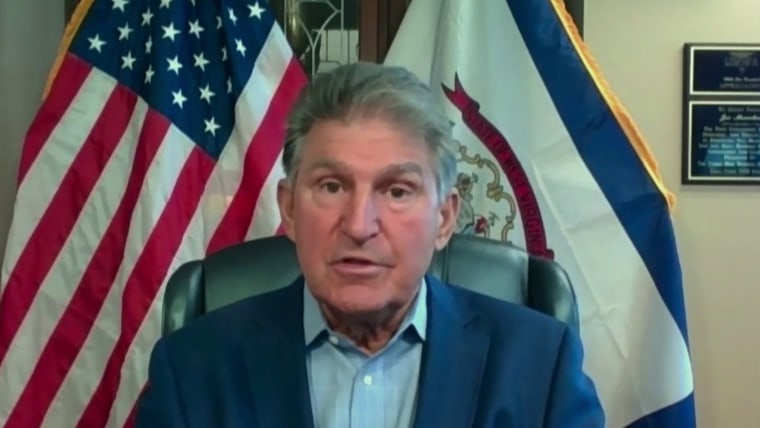WASHINGTON — Democratic leaders are performing a high-wire act to keep President Joe Biden’s economic agenda alive, seeking to balance tensions inside their party with pressure from Republicans who want to derail his plans to expand the social safety net.
In the coming weeks, Democratic leaders are hoping to formally begin the process of passing a multitrillion-dollar bill to invest in elder care, paid leave, climate change mitigation and other priorities. Leaders will utilize a procedural quirk to circumvent the filibuster and pass the bill with only Democratic support.
At the same time, they’re working to keep the $579 billion infrastructure deal with Republicans afloat, working to shore up support while senators are away from Washington for one more week and hearing from their constituents.
The two wings of the Democratic Party have struck an uneasy alliance in the hopes of delivering on both pieces of Biden’s agenda. Progressives need the moderates to pass the larger Democrats-only package. And moderates need the progressives to pass the bipartisan infrastructure deal.
“The White House has a political Rubik’s Cube on its hands,” said Matt House, a Democratic consultant and former communications director for Senate Majority Leader Chuck Schumer, D-N.Y. “Moderate Democrats and a desire to work in a bipartisan way is creating a complicated dynamic where solving one part of the puzzle creates a problem elsewhere. The reality is the slim majorities means they might not have any other choice.”
After speaking about the economy Friday, Biden acknowledged the challenge of the task when asked if he’s confident Congress will enact his plans. He paused upon hearing the question as he was walking away, then smiled and joked: “Who wants to put money on anything that Congress will do?”
“Look, folks. This is a process,” he said. “The only thing I know to do is do my best to lay out what the country has to do, try to be as persuasive as I can. … And thus far it seems to be working.”
But there’s a long way to go.
House Budget Committee Chair John Yarmuth, D-Ky., said his committee is working on crafting a budget resolution that would enable a major tax-and-spending bill to pass both chambers without Republican support.
He said the plan is to continue to operate as if the bipartisan deal won’t come to fruition but that if a deal is finalized, the infrastructure items can be stripped from the filibuster-proof bill.
Yarmuth will have to synchronize his plans with Senate Budget Committee Chair Bernie Sanders, I-Vt., who has floated a highly ambitious $6 trillion price tag that moderates have balked at.
Progressive lawmakers have a long wish list of items they’d like to include. For instance, they want to expand Medicare benefits and reduce the eligibility age, which Yarmuth said currently has the support of 75 percent of House Democrats, but he doesn’t know whether it could get the support of the other 25 percent.
Party leaders will have to resolve those — and many other — issues. They have no votes to spare in the evenly split Senate and can afford no more than four defections in the House.
“I haven’t totally figured out what’s going to be in this,” Yarmuth said of the reconciliation bill.
There isn’t much time left to figure it out. The goal is to pass that first step in the process, which requires agreeing on a price tag, before the monthlong August recess, Yarmuth said. After the recess, Congress will have other issues to grapple with, such as funding the government ahead of a Sept. 30 deadline and raising the expiring debt limit.
Senate Minority Leader Mitch McConnell, R-Ky., has sought to pressure House Speaker Nancy Pelosi, D-Calif., to delink the fate of the bipartisan deal, which he says he’s undecided on, to the Democrats’ safety net bill.
“We’re in kind of a stare down about whether one is connected to the other,” McConnell said Tuesday at an event in Lexington, Kentucky. “And what I’d like to see us do, and I know 20 members, including 10 Democrats in the Senate, would like to pass the thing we can agree on. And then we’ll have a debate or an argument and a vote over all the rest.”
But Pelosi has refused, working to hold her party together with a promise that the House will vote on the two bills together — after both pass the Senate.
She made the statement last week and told reporters on Wednesday she stands by it.
The bipartisan deal still has hurdles to clear, including an analysis by the Congressional Budget Office to determine whether the financing mechanisms add up. While the five Republican senators who struck the deal appear committed, it needs at least five more GOP votes to break a filibuster.
Among Democrats, there remain procedural disagreements.
Moderate Democrats including Rep. Stephanie Murphy, of Florida, and Rep. Josh Gottheimer, of New Jersey, say the House should vote on the bipartisan deal as soon as it’s ready — and not wait.
“If it’s ready to go, we should bring it to the floor and have a vote,” Gottheimer said, while adding that he is also open to a separate reconciliation bill that doesn’t require GOP support.
But Rep. Pramila Jayapal, D-Wash., the chair of the progressive caucus, said many lawmakers in the group have made clear they’d vote down the bipartisan deal without the reconciliation bill.
“It’s not just a few,” she said. “It’s dozens.”
Source: | This article originally belongs to Nbcnews.com











